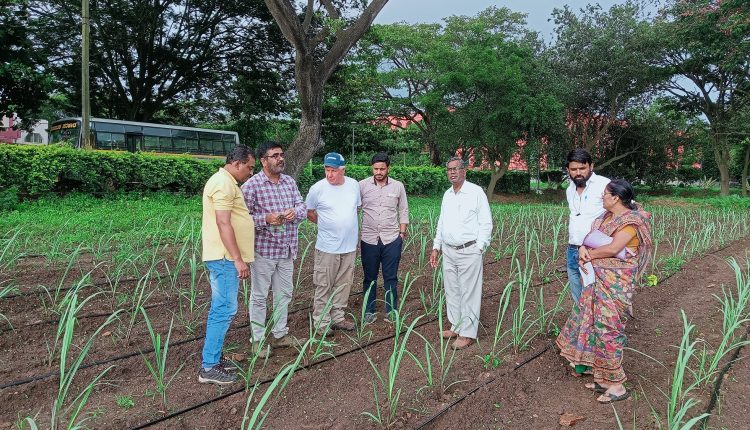Netafim Israeli Agronomist helps Singataluru Lift Irrigation Project farmers for higher crop productivity
~Organize a four-month long training program on higher crop productivity and best agriculture practices ~
Bengaluru : Netafim India, a leading smart irrigation solution provider with global agronomist Ityel Eviatar, has commenced a four-month-long training program for farmers of Singataluru Lift Irrigation Project package 1 and 3 in the Gadag district, Karnataka. The farmer education programs aim to reach thousands of growers of onion, maize, chilly, cotton, groundnut, red gram, and marigold in the project area and empower them with knowledge of Good Agriculture Practices.
The training program is scheduled from August 2022 to November 2022 with multiple on-field demonstrations, workshops, individual and cluster farmer meetings, and Capacity Building initiatives. The education program focuses on drip irrigation, fertigation, nutrient diagnostic kits, farm mechanization, and crop bed preparation. During the field training, farmers are empowered with the knowledge on various topics such as different methods to grow crops under diverse Soil, land preparation, sowing method, fertigation, Irrigation frequency, optimum growing condition for the plants, tackling biotic and abiotic stress conditions, transplantation in agriculture, and more.
Mr. Eviatar is closely working with water user cooperative associations of the project area. He is an Israeli agronomist with more than four decades of worldwide experience in surveys, feasibility studies, project planning, extension programs, and Crop and Farm Management. He has successfully conducted multi-dimensional agriculture training and studies across the USA, Africa, Israel, Switzerland, Fiji, China, Panama, and Sri Lanka, to name a few, and published many research papers on Soil and water management. He specializes in farm management for vegetable and horticulture crops and irrigation. He holds a Ph.D. in soil physics and an M.Sc in plant nutrition.
Global Agronomist Ityel Eviatar said, “The concept of a grower’s community managing their irrigation scheduling, through water association, is a combination of social, agronomical and technical scopes. The primary goal of such training and demonstrations is to increase farming productivity, help them cope with climate variability, and make farming profitable by encouraging them to adopt appropriate crop management practices”.
Many farmers across the project have already participated in the training program and are receptive to the suggestive methods. Poojar Kabeerdaas, a farmer from Mundargi taluka, said, “We saw the demonstration of different agronomic technologies that we have found them very useful. From what we have seen in the field, there is a significant impact in the application of fertilizer using drip irrigation system.” Another farmer from Mundargi taluka, Muttappa Kantikalla Lakshmavva, said, “During the field training I saw many technologies. I have learned that frequently removing the side suckers helps avoid competition and how drip irrigation can be successfully used for my crops”.
Mr. Umesha M C, Agronomist, Netafim India, said, “We aim to empower Singataluru Lift Irrigation project farmers with modern agriculture practices and crop management techniques that help to increase crop yield and substantially increase their income. We at Netafim has always been farmers’ cultural anthropologist and believe when farmers improve the quality and yields of their high-value crops, the impact can be transformative. The training program focuses on promoting the adoption of broad-based innovations used by countries across the globe”.
Singataluru Lift Irrigation Project endeavors to bring the entire farming community together through Community Drip Irrigation Project – to establish systematic and sustainable irrigation practices. The ongoing phase 1 of the project plans to bring 10,080 hectares of agricultural land under drip irrigation connecting 13 villages and 7800 farmers in this season under various crops and majority of the farmers have started taking the benefit.


